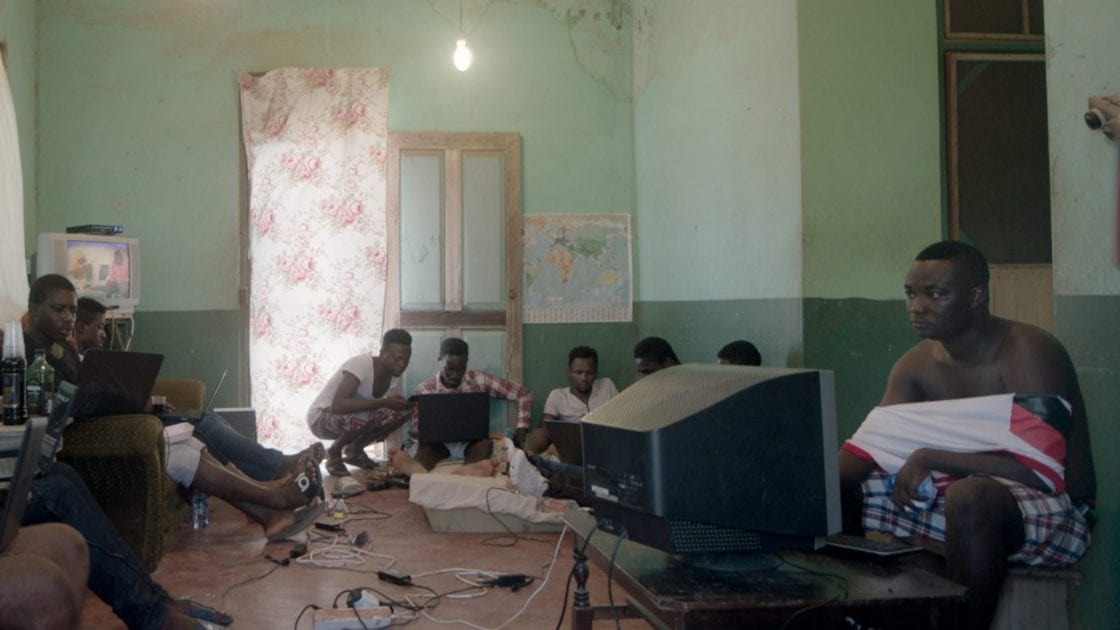Ever heard of a Catfish? Perhaps you just really want to know how to find out if someone is a catfish. This documentary may very well give you all the tips you need and then some. The show ‘Catfish’ was a TV series, not a movie that made the term famous. But, it’s someone who creates a fake profile anywhere on a social media platform to trick people for money or love. Sakawa was made by first-time director Ben Asamoah and premiered at the Amsterdam International Documentary Film Festival. It’s shown at the Toronto True Crime Film Festival and this Catfish movie is the real deal with real people.
Humanizing Bad Behaviour in Sakawa
I expected Sakawa to try and convince me or at least garner some empathy within the course of its 120-minute run-time. It centers around a bunch of unemployed youth in Ghana. I know little about the country itself. However, the internet tells me it has quite a low crime rate. It is generally unsafe for tourists. Statistics place the region into the middle-income bracket, and poverty is still fairly prevalent in some areas.
I guess the first thing that started me thinking about what I was seeing within the dynamic of this group of fraudsters was how they viewed ‘the whites.’ It becomes abundantly clear that the culture within this societal group justifies much of what they do by the sheer fact that ‘the whites’ won’t be harmed by what they take from them.
One young man briefly explains to another that he worked as a house boy and cook. His mother would instruct him over the phone on what to do and how to make dishes for this family. He vehemently points out that her weekly spending on the fish he would buy for her was about one-tenth of what he was paid. He sums up his tale that this is the reason, no one should feel sorry for getting scammed.
The question is though… who’s the bigger victim? The scammer or the bait appeasing their loneliness with a faceless entity?
How To Sound More Like A Woman When You Aren’t One
There are many anecdotes played out within conversations during the eye-opening Sakawa movie. Despite being a minute over two hours long, I was never bored. I found it difficult to find a solid moral compass among any of them. While a few wanted money for a better life, most would continue expanding the catfish empire by starting their own fraud farm.
A few of the guys point out that they were unable to afford the education or pursue the hopes and dreams they had due to their financial status before this endeavor. This is a means to an end for them. Yet, they see working laborious jobs as beneath them so are never spurred away from their activities. Why would they work such a menial and difficult career path for pennies when they can be a hustler?
Moreover, I watched as the next generation of children sat nearby watching these hustlers’ activities. It made me wonder how this cycle would ever end if each child was brought up seeing this as a way of life. I guess that’s true for a lot of ways of life.
Like any other country in the world, the relatable part was the pride they felt earning money they wouldn’t normally be privy to. But when you see them sitting in a hidden place, speaking in a female voice, and professing their love to the people on the other end of the phone, it’s not as glorified as they claim.
Catfishing the Catfish
For example, the lengths these people go to will astound you. I thought I knew the worst of what I knew about Catfish. The phone scams, the email scams, and the people that pop up with a casual hello on Facebook are all but a drop in the ocean when you realize this is not only a group but referred to as a ‘farm.’ They teach each other and give the group advice. If one is having no luck with outcomes, another might take over their client for a cut of the prize money.
One guy called ‘the voodoo priest’ makes his money buying hard drives collected from computers that have been disposed of. Watching them peruse the photos found on one of these devices while ticking off checkpoints of things that signify whether they will be a good person to scam. Are there photos showing them wearing jewelry, using current tech, and other details pointing to the financial status of potential bait? Once selected, some obtain voice-changing technology or, speak one-on-one in highly dubious sounding faked women’s voices. They use pre-recorded video calls and feign connection issues. Others engage in the services of men who will change their luck with the gods. Scammers who scam the scammers. It’s an interesting environment.
It seems the scammers are getting scammed too. There’s a market for any type of victim I guess.
Sakawa Catfishing Documentary – Streaming | Watch
Sakawa is streaming on:
Powered by
Director/Writer Ben Asamoah
Ben Asamoah is an “award-winning film director from Belgium with roots in Ghana. He studied audiovisual arts at ‘RITS School Of Arts’ and graduated as a film director.”
For another story inspired by true events about being swindled watch Trust No One, Fake 2024 or Inventing Anna next.
Sakawa is an open secret in Ghana and, a practice no one talks about but everyone knows. Young men and women catfish Westerners on the internet, rewarded with cash. Furthermore, it’s deceptive and shady but a means to an end. The book is based on the real-life experience of Kweku, a Sakawa practitioner.
Sakawa Movie Trailer
Sakawa is rated
3.5 Just hang up the phone out of 5
Sakawa

Director: Ben Asamoah
Date Created: 2019-03-07 17:08
3.5
